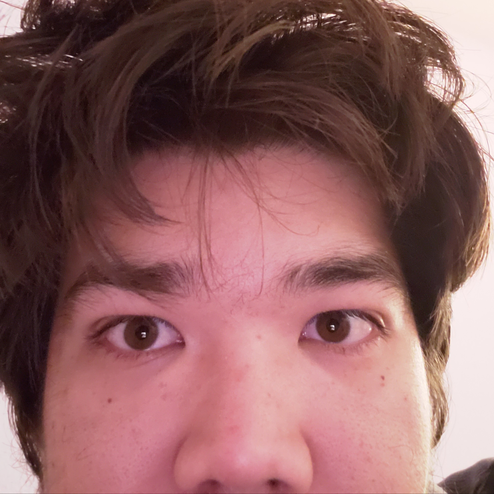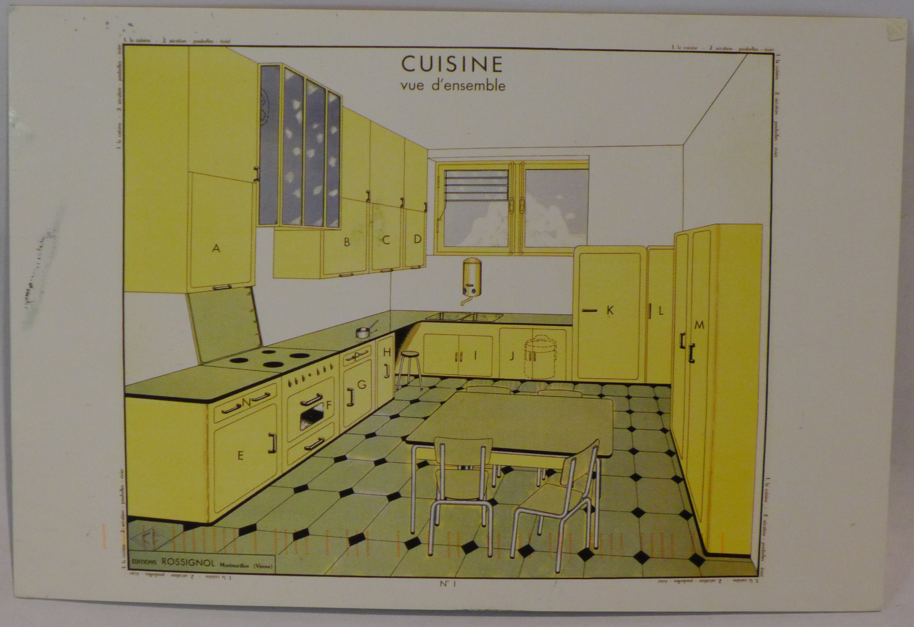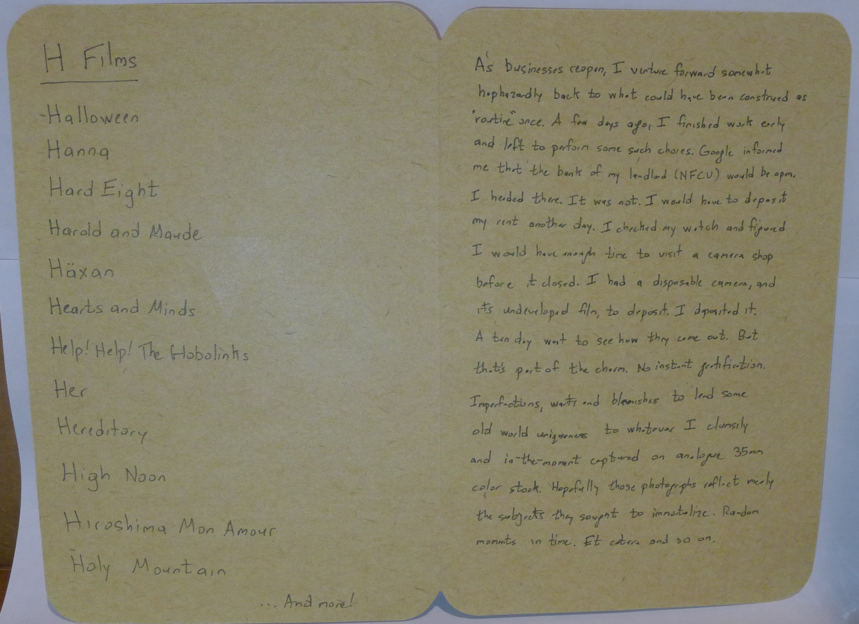The Drongo, Interview #5: Nick LeFlohic
by Maxwell Joslyn. .
Welcome once again to The Drongo, available wherever Internet connections are found.
Receive new interviews twice a month. Subscribe to The Drongo for free!

The Drongo: Our guest today is Nick LeFlohic, a biomedical researcher who, outside of work, has cultivated an appreciation for the arts, including film. Here's how he describes himself; ever the modest man, he's chosen to use the third person rather than appear egotistical.
Nick LeFlohic: Nicholas LeFlohic is a twenty-something wandering through days and ideas. He studied Biomedical Engineering in his native Southern California, and now works in a biological laboratory. Being intrigued by the historical, random, and unusual, he can often be found reading articles which are of no practical importance, but are intellectually stimulating (or so he hopes.) He is also perennially drawn to film, whether classic or contemporary, foreign or domestic, avant-garde or conventional, fictional or documentary. In short, he is amused by and interested in everything around.
The Drongo: Our first topic is Nick's love of sending postcards. I can vouch for his taste in such things, but don't take my word for it: I've kept every postcard Nick's ever sent me, and pictures of those postcards will appear throughout this interview.

The Drongo: Nick participates in an online community called Postcrossing, which bills itself as as follows: for each postcard you send, you will receive one back from a random postcrosser from somewhere in the world.
His profile is here.
Nick, why do you enjoy sending postcards?
Nick LeFlohic: I love the postal service. I've been intrigued by mail since childhood. The joy of running out to that little box outside the door to find something that has traveled many miles and many days to here: I still have some sense of that, despite there now being a good share of adverts and bills.
As much as I have enjoyed receiving correspondence, I've come to quite like, perhaps even more so, the act of sending cards out. It has a strong sense of community participation, and the feeling that someone's day may be made a little better through a random image and some badly-scribbled words. Aside from that, most social activities are quite anxiety-inducing. Mail removes some of that anxiety, and allows for some engagement with the world, even if it's limited.
The Drongo: Don't sell yourself short, bud. It's a fine thing to do. How do you find your postcards?
Nick LeFlohic: Oh, the cards I send come from a few places. Amazon is one source, as with almost anything nowadays. I've ordered, on one whim or another, box sets of themed cards: books, space, colors, random subjects. I've gotten cards from trips to museums and other places of interest. I do enjoy a nice gift shop every now and then. I miss 'em. And there's been random finds in various stores, grocery, book, or otherwise.
The result of all this is a box, tucked away under the bed, with a mess of postcards of various interests, which I send to friends and associates.

The Drongo: One way to recognize a drongo is by his or her unorthodox modes of communication. A predilection for postcards certainly counts.
Now, why don't we talk about your day job. You're an engineer in a biomedical research lab, and I understand that you're pulling exceedingly long hours. What are the goals of your research which make those hours worth it? You might also introduce the specific field in which you work.
Nick LeFlohic: The process and opportunity are very fulfilling, though the ongoing nature of my work leaves me unsure how much I can disclose. Out of an abundance of caution, that may not be a lot.
The Drongo: No problem. You can play it safe.
Nick LeFlohic: I’m currently working for a biotech startup seeking new and innovative cancer treatments. I have been happy to see and learn about the fast-paced biotech research landscape, with special respect to tissue culture, molecular biology, and immunology.
The skills I use at work are built on a foundation formed in previous roles. Before this job, I'd already gained experience with the isolation and culturing of primary mammalian cells, which in turn was preceded by collegiate introductions to laboratory research, mousework, dissection, and aseptic technique.
The Drongo: I'm beyond glad that there are people like you out there to kill and dissect lab mice. I'd faint.
Nick LeFlohic: A lot of steady handiwork and a comfortable relationship with repetition have served me well.
The Drongo: Yowza.
Nick LeFlohic: It also helps to be constantly awed by, and appreciative of, the opportunity to be a part of the scientific community, however minor.
The Drongo: What is it that drew you to this particular sector of the scientific community -- specifically, biomedical engineering, as opposed to pure biology, or another branch of engineering?
Nick LeFlohic: It was in the title. Or rather, I was drawn by the full title of the major, when I was making that choice way back in 2011. However, before explaining that, I’d like to give some background.

When I was much younger, I spent a lot of time ruminating on what I would do in the future. I had a lot of internal quibbling over this problem. I knew I wanted to help others, in some general fashion. Relatives often asked the old question, "What do you want to be when you grow up?" only to have an answer of "I 'unno. Something good for everyone?" There were some daydreams of quietly working in some support capacity somewhere, though thinking long on those, too, conjured risks and complications.
As I moved through school, no class was uninteresting, and the promise of becoming ever more acquainted with detail sustained my advancement in all areas. By late middle school, though, I felt drawn to science, both as a way of better understanding how things work, and a way to help improve what was around me. Medicine became the answer to the old aspirational questions, for entering the medical field would offer specialization, the opportunity to improve the well-being of others, and an applied understanding of the biological sciences.
The study of medicine became my background goal, ever-present, providing a nudge of academic and professional direction. However, being just as indecisive in my youth as I am now, I continued pursuing familiarity with as many subjects as possible.
By the time of filling out college applications, I felt my background was suitable enough to be a bona-fide premed student. I was not as competitive as others I knew, but I was determined to try. I looked through the available majors for what I thought was most appropriate — a major in the biological sciences — but UC Irvine had an offering that seemed particularly good: "Biomedical Engineering: Premed," or BME:P. It was in the title.

The Drongo: I knew that you'd been gunning for medicine from an early age, but I never knew that you chose biomedical engineering specifically to keep your set of possible futures as large as possible.
Nick LeFlohic: The major was specifically designed to prepare me for medical and/or graduate school, and it mixed classes from the schools of biological sciences and engineering. Once I actually began college, there was no doubt that the BME:P coursework suited both my predilection to be a jack of all trades, and my aspirations of doing medical or biological research. I learned to explain mechanisms scientifically, then apply my understanding in an engineering capacity. The cross-disciplinary requirements and the high standards made BME:P a little more difficult than its component majors (or so I was told), but it was worth it to be exposed to so many different subjects of study.
The Drongo: Since you mentioned earlier that your job requires knowledge from all your previous endeavors, it seems clear that your generalist approach has paid off! Good for you, Nick. May your head stuffed with facts forever stuff your wallet.
Nick LeFlohic: Thanks.
The Drongo: There remains one more piece of Nick magic to learn here at Drongwarts. OK, you're a film lover: what movie or movies do you cherish, and why? Focus on what's most meaningful to you, and don't worry about whether anything is "accessible" to casual viewers.
Nick LeFlohic: There are too many films out there for me to satisfyingly (in my eyes) create a list of any type, even a list of those which I hold most dear. That stated, for the sake of the exercise, here are some that I find myself going back to, and frequently suggesting.
The Royal Tenenbaums (Anderson, 2001) - I remember first catching this while I was in middle school. It was on a Saturday, in an edited form suitable for Comedy Central, but even with commercial breaks, and content removed for decency on syndicated cable, the unique cadence of the work captured me. From the ensemble cast of characters with their individual quirks (and great interplay between them), to the conceit of the film being an adaptation of a (fictional) novel, complete with chapters, to the themes of nostalgia for a promising, now-dashed future, and reconciliation after years of estrangement, I think this is a high point for Anderson, and worth seeing when you can.
Birdman (Iñárritu, 2014) - I'm going to throw out that I think I rewatched this movie the most in the theater in my years of going to the theater. It was an unusual year in college, my penultimate one: a time which held a constant sense of ennui for the impending future and, I thought, the trivialized present. The Birdman trailer had had me waiting for its arrival since spring of that year. I was intrigued by the premise of Michael Keaton playing a depressed former superhero actor who was struggling to move forward into new roles. It felt on-the-nose.
The technical and stylistic challenges of making the movie appear to be a single shot sealed the deal for my seeing it as soon as I could. Then I rewatched it to catch more details and references. Then I showed friends and family who would care to join me. Then, after I had seen everything else in the small cinema by the university, I watched it again. In all, I think I paid for seven tickets to see Birdman, which is excessive. It was an unusual time, as all times seem to be.
I actually have this available to loan on Bluray, if anyone's interested.
The Drongo: Yeah you do, drongo!
Nick LeFlohic: Next is Inside Llewyn Davis (Coen brothers, 2013) - The Coen brothers are great. There is such a variety to their stuff: throwbacks to noir, screwball comedies, ancient myths, literary adaptations, remakes, anthologies, and whatever Barton Fink is (go watch it). All imbued with a certain je ne sais quoi.
Llewyn Davis is a spiritual sequel to the Coen brothers' O Brother, Where Art Thou? from 2003. That movie is a reimagining of Homer's Odyssey in Depression America, centered on the Americana and popular folk music of the time. Llewyn Davis, by contrast, is more rooted in a harsher realism (though not too far removed from its predecessor) as a folk singer makes his way through New York in the 1960s. He is not much of a likeable character, but what he goes through will leave an impression on you. I like that Coen brothers films have many possible interpretations, and I enjoyed the depiction of the 1960s folk revival and popular culture. It also helps that I was constantly listening to the soundtrack (that the actors actually played in the film!) during the latter half of college.
It's Such a Beautiful Day (Hertzfeldt, United States, 2012) - Bill is a man whose run-of-the-mill life becomes affected by a progressive neurological disorder. It's funny. It's meditative. It's stick figures and splashes of color that left me lying in bed for a bit. I think I'll leave it at that. See it if you haven't. Please. And tell me what you like, or didn't. For anything, really, but this one especially.
Here are a few quicker, but no weaker, special mentions:
- The Atomic Cafe (Rafferty, Loader, and Rafferty, 1982) - A documentary wholly made up of period elements! No interviews! No retrospectives! An exercise in editing! An exercise in experiencing the sentiments of a previous era!
- Brazil (Gilliam, 1985) - Orwell meets Monty Python! Studio meddling! Diverging and converging ideas on how a dystopia is founded! Robert De Niro as a plumber!
- Closely Watched Trains (Menzel, 1966) - Wes Anderson before Wes Anderson! A coming-of-age story during the Second World War! Idiosyncrasies and quirks abound! Czechoslovak New Wave!
- Man with a Movie Camera (Vertov, 1929) - I love silent cinema! This one jumps to new heights! A film without intertitles! The city alive! Fast editing! Crazy editing! Soviet montage!
- A Page of Madness (Kinugasa, 1926) - Early Japanese silent horror?!
- Paths of Glory (Kubrick, 1957) - The First World War! Stanley Kubrick! Trenches and courtrooms!
The Drongo: Myriad movies! Knowledge Nicktastical! I promise I'll watch at least one of your recommendations this month, and I hope some readers will join me in doing the same. Perhaps we can have an all-drongo watch party! Nick, thanks so much for taking the time to speak about your work and hobbies with the The Drongo.
Readers, Nick is open to being emailed at niscle@gmail.com; you can also reach him on Letterboxd (for film), the aforementioned Postcrossing (for postcards), and Steam (for gaming.)
ⵘ ⵗ ⵘ ⵗ ⵘ
If you liked this interview, please share it on social media:
https://www.maxwelljoslyn.com/thedrongo/interviews/nick-leflohic
Thanks again to all you drongos. Join me again in late March for Interview #6 to hear Drew Jackson on librarianship, historical research, and wizards.